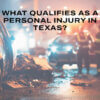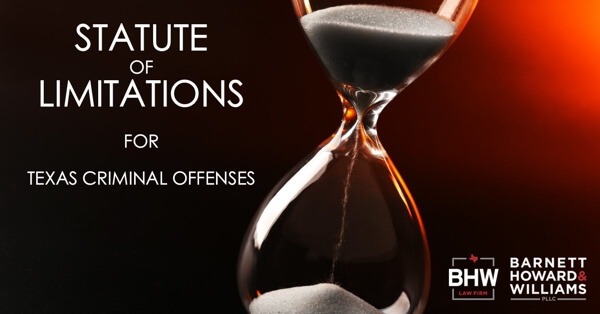
How Long Does the State Have to Bring a Criminal Case Against Me?
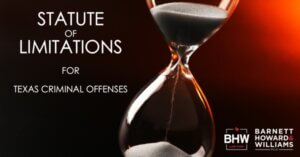 Texas law sets out the statute of limitations, the period during which formal charges must be brought against a defendant for most offenses. These time periods range from two years to over twenty years, and for some offenses there is no limitation period at all. The applicable limitation period depends on the particular offense that is alleged.
Texas law sets out the statute of limitations, the period during which formal charges must be brought against a defendant for most offenses. These time periods range from two years to over twenty years, and for some offenses there is no limitation period at all. The applicable limitation period depends on the particular offense that is alleged.
The various statutes of limitation mean that the state must present an indictment or information within said time period or prosecution will be time barred. The presentation of an indictment occurs when the grand jury has made its decision and the indictment is received by the court. Tex. Code Crim. Proc. Ann. Art. 12.06. The presentation of an information occurs when it has been properly filed in court. Tex. Code Crim. Proc. Ann. Art. 12.07. The limitations period is tolled while the case is pending after an information is filed or indictment issued. Tolling means that the time will not be counted against the limitations period.
Generally, the time period is measured based on the date the offense was committed. When computing the time period, the day on which the offense was committed and the day on which the charge was presented are excluded. Tex. Code Crim. Proc. Ann. Art. 12.04. Thus, the clock starts running the day after the offense was committed and is paused when the indictment or information is presented. Additionally, any time the defendant was absent from the state is excluded when computing the time period. Tex. Code Crim. Proc. Ann. Art. 12.05(1).
What Are the Time Periods in the Texas Statutes of Limitations?
TEXAS PERIODS OF LIMITATIONS FOR MISDEMEANOR OFFENSES
Texas law provides that for most misdemeanor offenses there is a standard period of limitations of two (2) years. Tex. Code Crim. Proc. Ann. arts. 12.02. The only exception is for Assault Family Violence allegations, for which the limitation period is 3 years. Thus, for any given misdemeanor charge, the State must bring prosecution within two years from the commission of the crime (or 3 years if the allegation is one of family violence).
TEXAS PERIODS OF LIMITATIONS FOR FELONY OFFENSES
There are several periods of limitations provided for the various felony offenses, as well as a catch all time period of three years for all other felonies not specifically provided for. Tex. Code Crim. Proc. Ann. art. 12.01(7). See the chart below for the time period provided for certain major felony offenses.
| PERIOD OF LIMITATIONS | FELONY OFFENSE |
| (A) Five Years
See Tex. Code Crim. Proc. Ann. art. 12.01(4). |
|
| (B) Seven Years
See Tex. Code Crim. Proc. Ann. art. 12.01(3). |
|
| (C) Ten Years
See Tex. Code Crim. Proc. Ann. art. 12.01(2). |
|
| (D) Ten Years from the Victim’s 18th Birthday
See Tex. Code Crim. Proc. Ann. art. 12.01(6). |
|
| (E) Twenty Years from the Victim’s 18th Birthday
See Tex. Code Crim. Proc. Ann. art. 12.01(5). |
|
| (F) No Time Limitation
See Tex. Code Crim. Proc. Ann. art. 12.01(1). |
|
| (G) Three Years
See Tex. Code Crim. Proc. Ann. art. 12.01(7). |
|
Periods of Limitations for Aggravated Offenses, Attempt, Conspiracy, and Solicitation
The limitation period for criminal attempt is the same as provided for the offense attempted. Tex. Code Crim. Proc. Ann. art. §12.03(a). Additionally, the limitation period for criminal conspiracy or organized crime is that of the most serious offense that is the subject of the conspiracy or organized crime. §12.03(b) Further, the limitation period provided for criminal solicitation is the same as the period of the felony solicited. §12.03(c). Finally, an aggravated offense has the same period of limitation as provided for the primary crime. §12.03(d)
In conclusion, these limitations are set out to protect defendants from having to face charges where evidence is stale and witnesses are unavailable due to the long period of time the State has waited to bring prosecution. The Texas Code of Criminal Procedure is very specific in how it has laid out the periods of limitations so that there will be no question as to the time period for a particular offense and how that time period should be computed.
*Note: The above provided chart is not all-inclusive but instead focuses on only some of the major felony offenses. An exhaustive list can be found in Section 12.01 of the Texas Code of Criminal Procedure.


 When you think about the Christmas season, you probably think about family time, presents, good food, and celebration. We think about those things too, but as criminal defense attorneys, we also think about the reasons that some of our clients get arrested during the holiday season. For this article, we took a look at the last 8 years of holiday season arrests (for clients that we represented) and compiled an (anecdotal) list of the top 5 reasons that folks get arrested during the Christmas/New Year’s season. Our goal is that this list will serve as a warning, so that your holiday season can be filled with the good stuff, rather than jail, bail, and calls to our office. Here goes:
When you think about the Christmas season, you probably think about family time, presents, good food, and celebration. We think about those things too, but as criminal defense attorneys, we also think about the reasons that some of our clients get arrested during the holiday season. For this article, we took a look at the last 8 years of holiday season arrests (for clients that we represented) and compiled an (anecdotal) list of the top 5 reasons that folks get arrested during the Christmas/New Year’s season. Our goal is that this list will serve as a warning, so that your holiday season can be filled with the good stuff, rather than jail, bail, and calls to our office. Here goes:
 Independence Day is right around the corner. You will probably start seeing the notices spread across social media from local police departments, warning that setting off fireworks (including sparklers) is illegal inside of city limits. We know that you’re probably going to do it anyway (so are we), but we wanted to let you know what Texas law provides regarding fireworks on the 4th of July.
Independence Day is right around the corner. You will probably start seeing the notices spread across social media from local police departments, warning that setting off fireworks (including sparklers) is illegal inside of city limits. We know that you’re probably going to do it anyway (so are we), but we wanted to let you know what Texas law provides regarding fireworks on the 4th of July.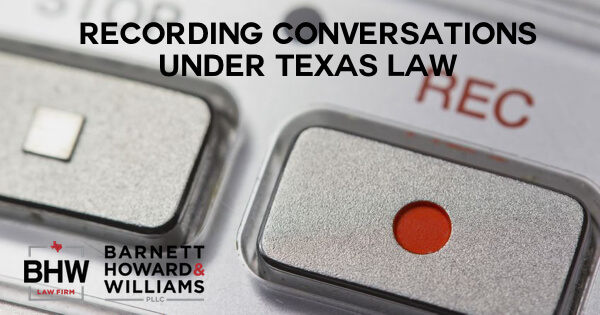
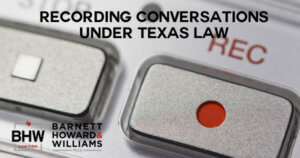 With roadway cameras at nearly every street corner, video surveillance in businesses, doorbell cameras on homes, web cams on computers, and recording capabilities on mobile phones – we must navigate carefully in a digital world. We’ve seen titillating news reports exposing a secret audio tape of a public figure having scandalous phone conversations, or video surveillance of questionable traffic stops that escalate in shocking fashion. You may have had a suspicious feeling that you were being recorded, or on the other hand, felt as if you needed to record a conversation with another for your own protection.
With roadway cameras at nearly every street corner, video surveillance in businesses, doorbell cameras on homes, web cams on computers, and recording capabilities on mobile phones – we must navigate carefully in a digital world. We’ve seen titillating news reports exposing a secret audio tape of a public figure having scandalous phone conversations, or video surveillance of questionable traffic stops that escalate in shocking fashion. You may have had a suspicious feeling that you were being recorded, or on the other hand, felt as if you needed to record a conversation with another for your own protection.
 Countless small businesses have been impacted by the
Countless small businesses have been impacted by the 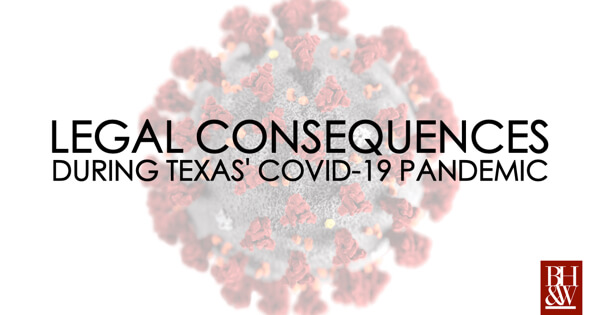
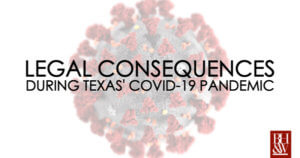 With the declaration of a state of disaster in Texas by Governor Greg Abbott on March 13,2020 comes some new consequences that Texas citizens need to be aware of.
With the declaration of a state of disaster in Texas by Governor Greg Abbott on March 13,2020 comes some new consequences that Texas citizens need to be aware of.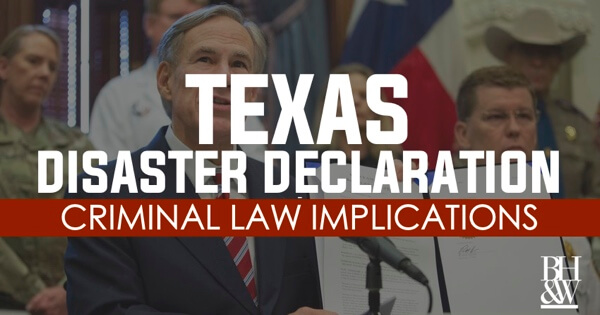
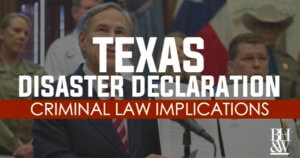 On March 13, 2020,
On March 13, 2020, 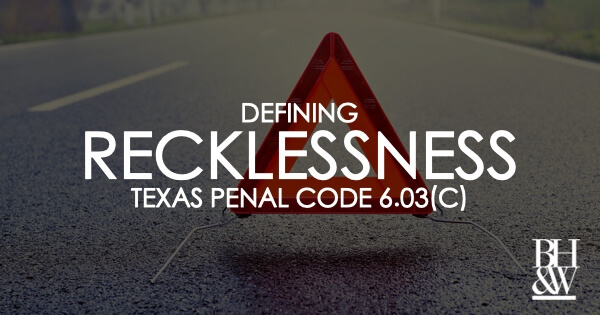
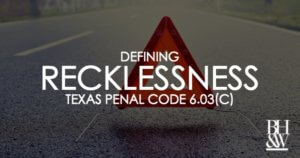 There are some criminal offenses that require the state the prove that the defendant acted “recklessly” or with “criminal recklessness.” In a colloquial sense, we (including prosecutors) often think of recklessness as another word for carelessness, but it actually has a specific definition in the Texas Penal Code.
There are some criminal offenses that require the state the prove that the defendant acted “recklessly” or with “criminal recklessness.” In a colloquial sense, we (including prosecutors) often think of recklessness as another word for carelessness, but it actually has a specific definition in the Texas Penal Code.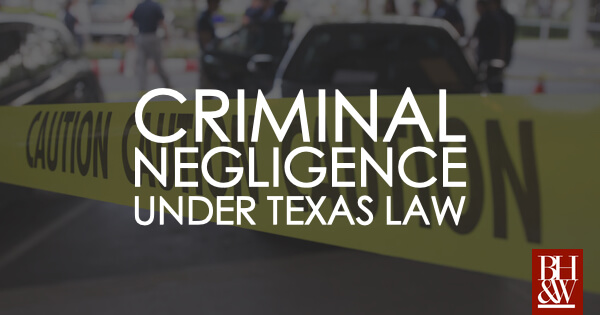
 In Texas, there are some criminal offenses for which a person can be liable if they acted with “criminal negligence.” When most people think of “negligence,” they think of a civil standard used in lawsuits for money damages. But criminal negligence, the courts have reasoned, is different from ordinary civil negligence.
In Texas, there are some criminal offenses for which a person can be liable if they acted with “criminal negligence.” When most people think of “negligence,” they think of a civil standard used in lawsuits for money damages. But criminal negligence, the courts have reasoned, is different from ordinary civil negligence.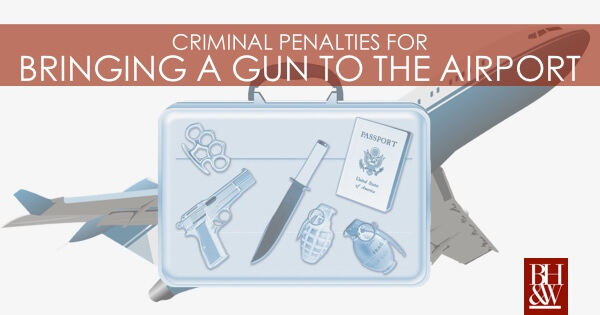
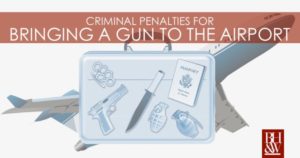 We love our guns in Texas. After all, those licensed to carry a handgun can now choose to conceal the handgun or wear it on their hip like in the old west. But carrying a handgun comes with its risks. Many places are designated as “off limits” for handguns. Chief among them is the airport. And everyday, well-meaning folks forget about their trusty handgun when they pack their bags and head to DFW International Airport or Love Field, only to be reminded by a less-than-friendly TSA agent as they attempt to pass through security. In fact, Texas is the #1 state for airport gun seizures in the country (and DFW International Airport leads the way in Texas).
We love our guns in Texas. After all, those licensed to carry a handgun can now choose to conceal the handgun or wear it on their hip like in the old west. But carrying a handgun comes with its risks. Many places are designated as “off limits” for handguns. Chief among them is the airport. And everyday, well-meaning folks forget about their trusty handgun when they pack their bags and head to DFW International Airport or Love Field, only to be reminded by a less-than-friendly TSA agent as they attempt to pass through security. In fact, Texas is the #1 state for airport gun seizures in the country (and DFW International Airport leads the way in Texas).
